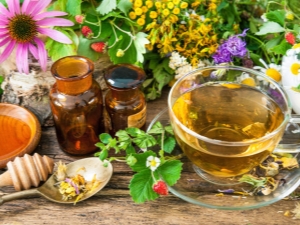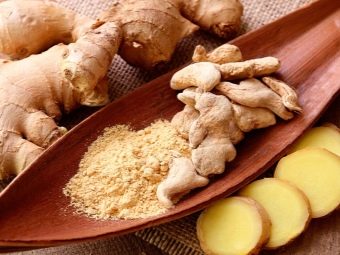Gastric tea: features and rules of use

Diseases of the stomach are accompanied by the appearance of numerous adverse symptoms.Gastric tea can reduce these clinical manifestations. This article will tell you in detail about the features and rules of this drink.
Composition and use
According to statistics, more than 75% of the population of our planet suffers from various diseases of the digestive system. Often these pathologies occur in a chronic form. The danger of these diseases is that they can occur with periodic exacerbations. People suffering from chronic gastritis are forced to follow a diet for life. With any errors in the diet, they may develop adverse symptoms.
Gastritis is a chronic pathology of the stomach, accompanied by inflammatory and dystrophic changes in gastric cells. This pathology, unfortunately, is now quite common. During an exacerbation, a person suffering from this disease experiences abdominal pain and indigestion.
Heartburn may be a characteristic sign of exacerbation of gastritis with high acidity. The burning sensation is often so strong that it can help reduce appetite. Coping with the symptoms can be extremely difficult. In addition to drug therapy and dieting, various gastric plant preparations are often used to eliminate adverse symptoms. Herbal teas help reduce the inflammation that occurs, and also contribute to the healing of the inflamed stomach wall during gastritis aggravation.
The composition of the herbal collection for the treatment of gastric pathologies may be different. The effect on the organism largely depends on which plants were included in its composition. Thus, the following elements are often present in the plant's gastric collections.
- Anise. Its seeds can have a detrimental effect on bacteria. It is believed that the consumption of anise helps to reduce Helicobacter pylori in the stomach. This microbe can not only provoke the development of chronic gastritis, but also become one of the causes of a stomach ulcer. Also, anise seeds help to reduce flatulence, bloating in the stomach, contributing to the normalization of intestinal motility.
- Yarrow It has an antispasmodic, hemostatic, wound healing, anti-inflammatory effect. Promotes the formation of gastric juice. Helps to cope with strong flatulence.
- Chamomile. It has a pronounced anti-inflammatory effect. Able to relieve cramps, improves the functioning of the gastrointestinal tract. It leads to relaxation of the smooth muscles of the organs and bile ducts, thereby contributing to the normalization of digestive processes.
- Mint. It has an antispasmodic effect, helps to cope with gas and flatulence. Contributes to the normalization of peristalsis, helping to adjust the chair. Often used in the treatment of irritable bowel syndrome, as well as in a number of its diseases.
- Dandelion (roots). It has a choleretic effect. Helps eliminate spasms, thereby promoting normal digestion. Used in herbal preparations for the prevention and treatment of constipation.
- Calendula. For the preparation of fees often used flowers of this plant. It has an antispasmodic effect, improving peristalsis. Helps to remove gas and bloating in the stomach.
- Ginger root. Able to stimulate the cells of the stomach, which leads to an increase in the synthesis of gastric juice. Helps reduce dyspeptic symptoms that often occur in people with chronic bowel disease.
- Air. It has a pronounced antibacterial effect. Helps to cope with adverse symptoms resulting from food poisoning or toxic infection.
- Althaea. It has anti-inflammatory effect, helps to reduce the inflammatory process and normalize well-being.Rarely used independently, often used as part of complex gastric teas.
- Plantain. Helps to cope with adverse clinical signs of gastritis with reduced secretion.
- Licorice. It has analgesic and regenerating effects, therefore, it is often used to treat peptic ulcer.
The composition of herbal gastric teas may vary. In many ways, the choice of a particular collection is determined by the pathology, the therapy of which is necessary to conduct. That is why it is necessary to choose the herbal collection before its use only after visiting a gastroenterologist and a comprehensive examination.
Operating principle
In the collections of herbs intended for the treatment of gastric and intestinal diseases, plants are included, which have a beneficial effect on the digestive processes. In people suffering from chronic pathologies of the stomach or intestines, the digestion of food is disturbed. Herbal extracts of herbal teas have a beneficial effect on the synthesis of gastric juice, which leads to an improvement in the digestive processes. Such exposure also reduces the risk of developing abdominal pain and dyspepsia.
In order to eliminate the uncomfortable clinical signs that occur during the exacerbation of gastritis with increased secretion of gastric juice, you should choose herbal teas that:
- help reduce the synthesis of hydrochloric acid;
- help reduce inflammation;
- prevent the damaging effect of hydrochloric acid on the cells of the stomach;
- have a regenerative effect.
The composition of these herbal fees can be different. Some of them contain green tea. The combination of different herbs provides a more pronounced effect.
If a person suffers from gastritis with reduced secretion, then he should choose several other herbal preparations. The plant components that are part of them should have a stimulating effect on the cells of the stomach. This will contribute to the formation of additional gastric juice. As a rule, herbs that have a bitter taste have such an effect on the body.
Herbs can also be used to treat chronic pancreatitis. The correct combination of plants helps to reduce the inflammatory process in the pancreas and improve the functioning of the body. When choosing plants for the treatment of pancreatitis, one should acquire those that also have a regenerating, anti-inflammatory and antibacterial effect.
Contraindications
Gastric tea is not just a thirst quench drink. Misuse of this product can cause great harm to the body. Doctors note that it is not worth starting treatment of a chronic pathology of the stomach on your own without undergoing a comprehensive examination. In such a situation, the risk of adverse effects after ingestion of gastric tea can be quite high.
When drinking medicinal drinks for treating the stomach, you should remember that herbs that make them up can trigger the onset of allergy symptoms. The more plants are included in the collection, the greater the chance of developing allergic manifestations. People with a predisposition to allergies, to use these drinks should be after a mandatory consultation with a doctor.
Before buying herbal for treating gastric diseases, you should carefully study the composition. If there is an individual intolerance to a plant in a person, then you should not buy such a fee.
Care should be taken when consuming gastric teas also for people who have just undergone a surgical operation on the stomach. To drink herbal tea, as a rule, in this case is allowed only after a few weeks from the moment of surgery. The possibility of taking such herbal remedies should also be discussed with your doctor.
Gastric teas, especially those containing several plants, can affect the functioning of the cardiovascular system. This should definitely be remembered for people suffering from hypertension, vascular pathologies or heart disease. Herbs that are part of the gastric collection, can weaken the effect of some drugs used to stabilize blood pressure. In this case, it is necessary to consult with a general practitioner or cardiologist about the possibility of using the gastric collection.
How to drink?
Eat the gastric collection should be properly. In this case, the risk of undesirable consequences for the organism will be minimized. At each grass collection necessarily present instructions for use. With the help of the instructions, you can get information on how to properly brew medicinal tea, as well as how much and how often to drink it. Note that these recommendations are averaged.
If, against the background of compliance with all the recommendations according to the instructions for the collection of herbs, improvement of well-being does not occur, then in this case it is necessary to consult a doctor. The cause of this situation may be comorbidities. In this case, a revision of the entire treatment regimen is required and, as a rule, amending.
When consuming gastric tea, it is imperative to pay attention to the time of administration. So, drinks that stimulate the secretion of gastric juice, are usually appointed for half an hour before meals. To follow such recommendations should be strictly, as, otherwise, the effect of the therapy will simply not be.
Recipes
Drinks that help to cope with adverse clinical signs of diseases of the stomach, you can prepare yourself. For their preparation, you should use only high-quality vegetable raw materials. Thus, the effect of home therapy will be significantly higher.
To eliminate pain in the epigastrium at home, you can prepare herbal collection with chamomile. For its preparation it is necessary to mix in equal shares the following plants:
- mint;
- daisy;
- flax seeds;
- licorice roots.
One tablespoon of the mixture should be poured over 250 ml of boiling water and kept in a water bath for 4-6 minutes. The resulting medicinal drink must be cooled to a comfortable temperature, filtered, and only then you can drink. To use this herbal tea should be half a glass 2-3 times a day for half an hour before meals for three days.
Recommendations
Reviews of real buyers of pharmaceutical gastric teas indicate that such herbal preparations are quite effective. People who consumed these drinks note that their intake helped reduce the occurrence of gastritis exacerbations and other chronic diseases of the stomach.
In order for the effect of the use of gastric tea pleased, you should pay attention to the following recommendations.
- Buy only proven medicinal herbal fees. Products of doubtful production should not be purchased. The use of low-quality teas can lead to a deterioration of health, as well as exacerbation of gastritis.
- Before the course taking gastric tea is better to consult a doctor. People who, due to the presence of chronic pathology of the stomach are forced to constantly take medicine, should not drink gastric tea without a decision of the gastroenterologist.
- Be sure to follow the recommended dosage. Excess dosage when consuming gastric tea may increase the risk of side effects. If the state of health worsened while taking a therapeutic drink, then in this case you should immediately consult a doctor.
To learn how to make monastic tea for gastritis and stomach ulcers, see the following video.


































